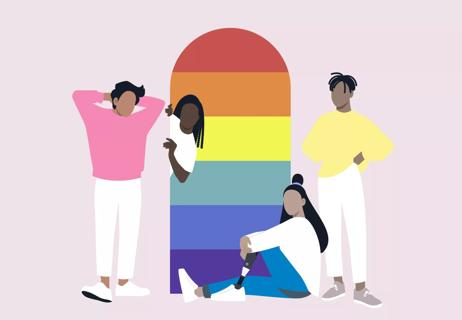This romantic orientation involves little to no romantic attraction to others and exists on a spectrum

Despite what you may see in the movies, the greatest moments in life don’t always revolve around falling in love. For people who are aromantic and experience little to no romantic attraction to others, that may ring especially true.
Advertisement
Cleveland Clinic is a non-profit academic medical center. Advertising on our site helps support our mission. We do not endorse non-Cleveland Clinic products or services. Policy
Instead of swooning for a crush or pouring their energy into romantic relationships, people who are aromantic often receive joy and fulfillment from other areas of their lives and other aspects of their relationships, should they choose to be in them.
And while having a relationship may not always be a main motivator for someone who is aromantic, they’re still capable of experiencing platonic affection and establishing relationships with lifelong friends and platonic partners in the absence of romantic interest.
Psychologist Dawn Potter, PsyD, talks more about aromanticism and how it affects relationships, along with signs you may identify as aromantic.
Commonly referred to as “aro” for short, “aromantic” is an umbrella term for a romantic orientation in which there’s generally little to no romantic attraction to others. Although there’s a common misconception that someone who’s aromantic may have difficulty experiencing or expressing affection, that’s not always true.
If you’re aromantic, you may express affection in different ways or value different aspects of relationships beyond “traditional” romance (if you’re interested in relationships at all). And just because you’re aromantic, it doesn’t mean you’ll never experience affection, never fall in love or never have healthy, sexual relationships.
Advertisement
Aromantic shouldn’t be confused with asexual. Although some individuals may identify as both asexual and aromantic, asexuality is a sexual orientation that generally refers to someone who has little to no sexual attraction toward others. But people can (and do) have sex without falling in love all the time — including people who are aromantic. That’s just a normal part of being human.
Beyond the physical aspects of courtship, people also strike up relationships and start families for all kinds of reasons. In fact, there are different types of love and ways to support your partner(s) beyond what we think of as romantic love.
“In the bigger realm of psychology, we conceptualize love as meaning several different things. There’s passionate love, which includes sexual attraction, and there’s companionate love, which is more about intimacy, closeness, romance and appreciation for your partner that takes time to develop,” discerns Dr. Potter.
“In long-term relationships, passionate love generally tends to decrease over time and companionate love tends to increase over time. But a person who is aromantic is probably less inclined toward developing passionate love and more inclined to developing companionate love.”
That means someone who’s aromantic is less likely to fall head over heels for someone or even experience feelings of a fleeting crush. But what’s more likely to occur is that, over time, someone who is aromantic might establish lifelong partnerships with people they feel intimately close to and vulnerable with.
As with other aspects of ourselves like sexual orientation, people come to understand what aromantic means for them in different ways. According to the Aromantic-Spectrum Union for Recognition, Education and Advocacy (AUREA), some common experiences or signs that you may be aromantic include elements like:
Advertisement
“People who identify as aromantic likely experience feeling invisible when everyone is saying things like, ‘We need to get you a boyfriend or girlfriend,’ or ‘How come you haven’t settled down yet? Aren’t you sad? Aren’t you lonely?’” explains Dr. Potter. “Most likely, if they are filling their lives with the kind of relationships they do want, they’re not lonely and they don’t desire a different type of relationship than whatever they have.”
Like asexuality, aromanticism exists on a spectrum with other subtypes that evolve based on a person’s lived experiences and how they feel in relation to their romantic orientation.
“It’s important to acknowledge that aromanticism is a spectrum in the same way that it’s important we remember that LGBTQIA+ people exist,” advises Dr. Potter. “When you live in a world that’s heterosexist and you’re LGBTQIA+, you can often feel excluded and you may not feel represented because people make assumptions all the time about who your partner may or may not be.”
Some common identity terms that are used within the aromantic community include:
Advertisement
“When we don’t pay attention to these communities and we are alloromantic and allosexual and we say or think things like, ‘Look at that poor single person, they are sad and lonely,’ that’s not helpful because then we’re not seeing people for who they really are,” recognizes Dr. Potter. “That’s psychologically damaging to people in these groups, and we should normalize and support their existence.”
Aromantic people can love others, but the idea of love in aromantic relationships often takes on different definitions of love that exist beyond the traditions we associate with pop culture romance. Love, in these instances, is often not the main motivator in relationships and it’s not something of a priority in many cases when it comes to providing value and meaning to someone’s life.
Remember, a person who is aromantic may not be interested in having a romantic relationship at all. Instead, they might prioritize and value the freedom of being single and independent. That form of self-love on its own is just as valid and self-sufficient for those who are aromantic and have no desire for romantic relationships.
“Many people perceive a loving committed relationship to be the way to obtain happiness and fulfillment in life, however, this is not a universal truth,” explains Dr. Potter. “People can and do find happiness and fulfillment in their friendships, family relationships, in work, in leisure, and with their pets. It is important not to infer that someone is single because they have a problem or that being single is a problem for them.”
Advertisement
Other aromantic individuals might establish long-lasting, platonic relationships with life partners or prioritize close friendships over romantic connections instead. In these relationships, partners may live together, combine their finances, purchase homes or co-parent children the way anyone else would in an alloromantic relationship. The difference is, rather than invest in traditional romantic gestures and the romance of it all, partners in these kinds of very real relationships may prioritize familial, companionate love and other aspects of their relationship that support their chosen family values.
“You’re doing things romantic couples do, but just not having that subjective experience of love or romance and romantic attraction, however that person defines it,” explains Dr. Potter.
“Maybe a person has a partner that they live with. They may not necessarily be in love with them, but they’re still very close like you might be to a friend. Your partner may not be a roommate; they’re a life partner.”
We live in a digital world where we’re often confronted by the idea that we must find our true love lest we be faced with a lifetime of loneliness. But the reality is, we don’t need romance or relationships to live healthy, fulfilling lives as long as we take care of ourselves, honor who we are and support our core values.
Aromantic people are faced with stigma and misconceptions about what it means to be in and without a relationship. If you know someone who’s aromantic, you can be supportive in a few different ways:
Recognition and respect go a long way in promoting happiness and a strong sense of self. When we support one another and appreciate people for who they are, down to all the wonderful things that add to their diversity, people experience markedly improved outcomes in their physical, mental and emotional health and well-being. At the end of the day, that’s what loving anyone is all about.
“When a person identifies themselves as aromantic, it can be a huge and scary step. It‘s actually a very countercultural thing to do,” acknowledges Dr. Potter. “The pursuit of romantic love is central in much of our entertainment media and it is a huge piece of a lot of people’s formative years. To say, ‘Actually, I am not interested in that’ can be difficult and freeing at the same time. So, it‘s important that we respect other’s ability to decide for themselves how and if they wish to have relationships.”
Learn more about our editorial process.
Advertisement

Start with one person you trust, and then you can open the door to the rest of the world

The more developed your EQ, the more in touch you are with your feelings, as well as with others’

Strengthening your EQ involves reflection, accountability and practice

This process of manipulation and abuse can stem from what may initially seem to be an innocent relationship with a stranger or adult authority figure

A hostile work environment can foster a culture of aggression, doubt and negativity that’s harmful to your health and success

Abuse can cause trauma and psychological harm that keep you complacent — you deserve better

Disconnecting from a loved one is a self-protective measure — and it’s usually a last resort

Be cautious when others try to influence your decisions — especially if it goes against your values

If you’re feeling short of breath, sleep can be tough — propping yourself up or sleeping on your side may help

If you fear the unknown or find yourself needing reassurance often, you may identify with this attachment style

If you’re looking to boost your gut health, it’s better to get fiber from whole foods